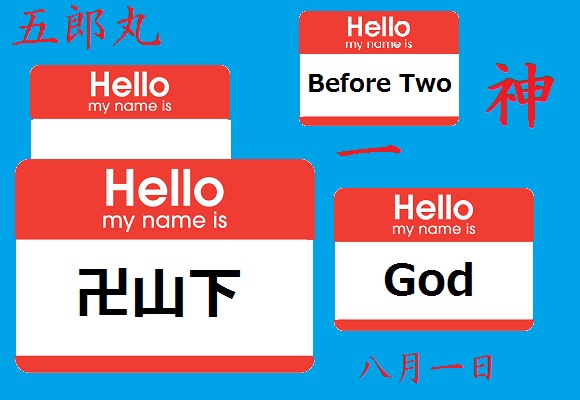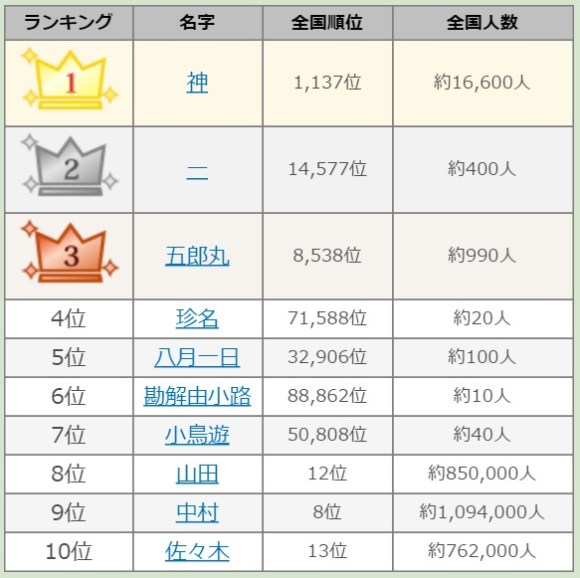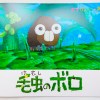
Net users voted, and now Japan’s favorite last names of 2015 have been revealed!
Our family names are unique because, unlike our given names, their true origins are rarely known. They have been passed down from generation to generation, often giving insight into what our ancestors did for a living or where they resided.
Popular given names change from year to year based on trends and the names parents are particularly fond of at the time, but it’s interesting to think about what would become the most popular if we had a say in what our family names were.
For the third year in a row, the website Myoji-Yurainet held its “Best of Myouji” (or “Best of Family Names”) contest to find out which names Japanese netizens liked the most, announcing the results on its website. The top 10 are as follows:
1. 神 (Jin, Kami)
2. 一 (Ichi, Ninomae)
3. 五郎丸 (Goromaru)
4. 珍名 (Chinna)
5. 八月一日 (Hazumi, Yabumi, Hassaku)
6. 勘解由小路 (Kadenokoji)
7. 小鳥遊 (Takanashi)
8. 山田 (Yamada)
9. 中村 (Nakamura)
10. 佐々木 (Sasaki)
After rising up from third place in 2013 to second place in 2014, the family name Kami, the character of which means “god” (and can also be read as “Jin”) has claimed the spot for first place!
In addition to their rank by popularity, the website also listed each name’s rank by how common each name is amongst all Japanese surnames, as well as how many people throughout the country have each particular name. While you might think that Kami/Jin/”God” wouldn’t be very common, we can see that at least 16,000 people have been blessed with this holy moniker, 42 percent of whom are reported to be living in Aomori, the prefecture furthest north on Japan’s main island of Honshu. One has to wonder how this last name came about in the first place. The original family must have been a very revered bunch!
On to the second-place entry, we see a character that looks like nothing but a long dash, but if you’ve studied kanji this is probably one of the very first (and simplest!) characters that you’ve learned. It is the kanji character for the number one, and while normally read “ichi“, as a name it can also be read as “Ninomae”. It is said that the reason for this interesting reading is because the number one comes before (mae) the number two (ni), with “no” being a possessive marker: ni-no-mae.
Other names that made the list have some rather interesting meanings. Goromaru, for example, carries the meaning “five sons round”, Hazumi/Yabumi/Hassaku means “August 1st”, and the characters that form the name Kadenokoji mean “perception”, “understanding”, “reason”, and “small road”.
Is God strong enough to hold the first place mark for 2016 too? Or will “Swastika Under Mountain”, which just barely missed making the top 10, creep up from 12th place? This interesting name is written with an actual swastika, facing the original position it was meant to as a Buddhist symbol: 卍山下, and read as Manzanka or Manjiyamashita.
Personally, I will be rooting for Nose Hair (鼻毛, Hanage), which made the top 10 in 2013, to make a comeback!
Sources: Myoji-Yurainet, Internetcom
Top image: Wikipedia/Eviatar Bach, RocketNew24 (edited by RocketNews24)


 Princesses, fruits, and blacksmiths: Study reveals the 30 most unusual family names in Japan
Princesses, fruits, and blacksmiths: Study reveals the 30 most unusual family names in Japan Saitama is home to the best strawberries in Japan that you’ve probably never even heard of
Saitama is home to the best strawberries in Japan that you’ve probably never even heard of Highest Starbucks in Japan set to open this spring in the Tokyo sky
Highest Starbucks in Japan set to open this spring in the Tokyo sky Japan has only one airport named after a samurai, so let’s check out Kochi Ryoma【Photos】
Japan has only one airport named after a samurai, so let’s check out Kochi Ryoma【Photos】 Skyscraper sized Pokémon cards to appear in Tokyo all year long in Tocho projection mapping event
Skyscraper sized Pokémon cards to appear in Tokyo all year long in Tocho projection mapping event Boro the Caterpillar anime now showing at the Ghibli Museum in Tokyo 【SoraReview】
Boro the Caterpillar anime now showing at the Ghibli Museum in Tokyo 【SoraReview】 Foreign tourists in Japan will get free Shinkansen tickets to promote regional tourism
Foreign tourists in Japan will get free Shinkansen tickets to promote regional tourism Five Okinawan foods that have changed our reporter’s view on local cuisine forever
Five Okinawan foods that have changed our reporter’s view on local cuisine forever Say hello to Japan’s new generation of adults, fresh from Kitakyushu’s 2023 seijinshiki ceremony
Say hello to Japan’s new generation of adults, fresh from Kitakyushu’s 2023 seijinshiki ceremony What’s on the all-you-can-drink menu at Denny’s Japan? 【Family Restaurant Drink Bar Showdown】
What’s on the all-you-can-drink menu at Denny’s Japan? 【Family Restaurant Drink Bar Showdown】 Osaka establishes first designated smoking area in Dotonbori canal district to fight “overtourism”
Osaka establishes first designated smoking area in Dotonbori canal district to fight “overtourism” The 10 most annoying things foreign tourists do on Japanese trains, according to locals
The 10 most annoying things foreign tourists do on Japanese trains, according to locals Starbucks Japan releases new sakura goods and drinkware for cherry blossom season 2026
Starbucks Japan releases new sakura goods and drinkware for cherry blossom season 2026 Is Sapporio’s Snow Festival awesome enough to be worth visiting even if you hate the snow? [Pics]
Is Sapporio’s Snow Festival awesome enough to be worth visiting even if you hate the snow? [Pics] Japan has trams that say “sorry” while they ride around town…but why?
Japan has trams that say “sorry” while they ride around town…but why? Tokyo Skytree turns pink for the cherry blossom season
Tokyo Skytree turns pink for the cherry blossom season Japan’s new “Cunte” contact lenses aren’t pronounced like you’re probably thinking they are
Japan’s new “Cunte” contact lenses aren’t pronounced like you’re probably thinking they are Shibuya Station’s Hachiko Gate and Yamanote Line stairway locations change next month
Shibuya Station’s Hachiko Gate and Yamanote Line stairway locations change next month Yakuzen ramen restaurant in Tokyo is very different to a yakuza ramen restaurant
Yakuzen ramen restaurant in Tokyo is very different to a yakuza ramen restaurant Starbucks Japan adds new sakura Frappuccino and cherry blossom drinks to the menu
Starbucks Japan adds new sakura Frappuccino and cherry blossom drinks to the menu Japan’s newest Shinkansen has no seats…or passengers [Video]
Japan’s newest Shinkansen has no seats…or passengers [Video] Foreigners accounting for over 80 percent of off-course skiers needing rescue in Japan’s Hokkaido
Foreigners accounting for over 80 percent of off-course skiers needing rescue in Japan’s Hokkaido Super-salty pizza sends six kids to the hospital in Japan, linguistics blamed
Super-salty pizza sends six kids to the hospital in Japan, linguistics blamed Starbucks Japan unveils new sakura Frappuccino for cherry blossom season 2026
Starbucks Japan unveils new sakura Frappuccino for cherry blossom season 2026 Take a trip to Japan’s Dododo Land, the most irritating place on Earth
Take a trip to Japan’s Dododo Land, the most irritating place on Earth Naruto and Converse team up for new line of shinobi sneakers[Photos]
Naruto and Converse team up for new line of shinobi sneakers[Photos] Is China’s don’t-go-to-Japan warning affecting the lines at a popular Tokyo gyukatsu restaurant?
Is China’s don’t-go-to-Japan warning affecting the lines at a popular Tokyo gyukatsu restaurant? Survey asks foreign tourists what bothered them in Japan, more than half gave same answer
Survey asks foreign tourists what bothered them in Japan, more than half gave same answer Japan’s human washing machines will go on sale to general public, demos to be held in Tokyo
Japan’s human washing machines will go on sale to general public, demos to be held in Tokyo Starbucks Japan releases new drinkware and goods for Valentine’s Day
Starbucks Japan releases new drinkware and goods for Valentine’s Day We deeply regret going into this tunnel on our walk in the mountains of Japan
We deeply regret going into this tunnel on our walk in the mountains of Japan Studio Ghibli releases Kodama forest spirits from Princess Mononoke to light up your home
Studio Ghibli releases Kodama forest spirits from Princess Mononoke to light up your home Major Japanese hotel chain says reservations via overseas booking sites may not be valid
Major Japanese hotel chain says reservations via overseas booking sites may not be valid Put sesame oil in your coffee? Japanese maker says it’s the best way to start your day【Taste test】
Put sesame oil in your coffee? Japanese maker says it’s the best way to start your day【Taste test】 No more using real katana for tourism activities, Japan’s National Police Agency says
No more using real katana for tourism activities, Japan’s National Police Agency says